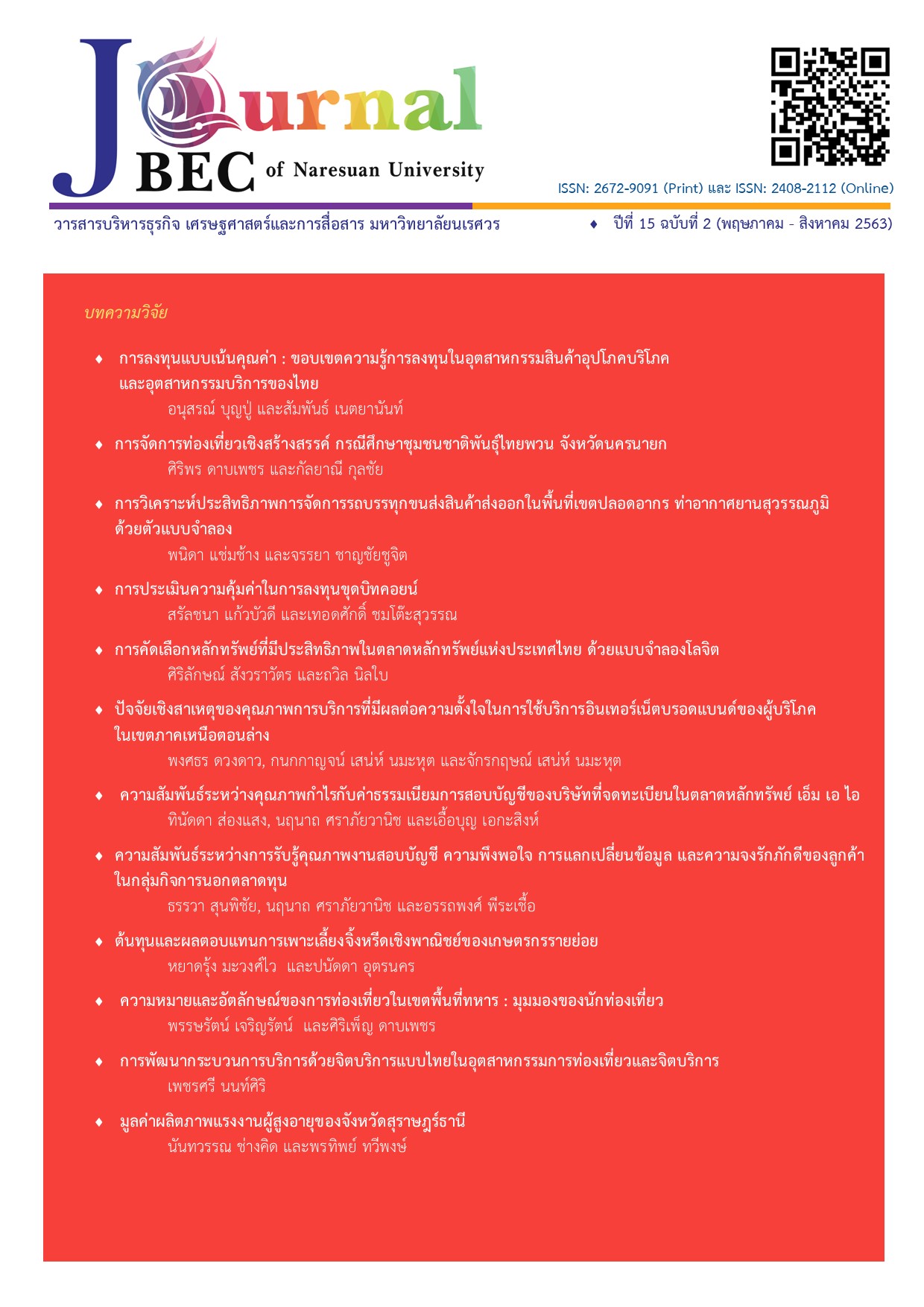การจัดการท่องเที่ยวเชิงสร้างสรรค์ กรณีศึกษาชุมชนชาติพันธุ์ไทยพวน จังหวัดนครนายก
Main Article Content
บทคัดย่อ
งานวิจัยนี้มีวัตถุประสงค์เพื่อนำเสนอกิจกรรมการท่องเที่ยวเชิงสร้างสรรค์จากทุนทางวัฒนธรรมของชาวไทยพวน นครนายก เป็นการวิจัยเชิงคุณภาพใช้การค้นคว้าด้านเอกสารและการสัมภาษณ์เชิงลึก มีผู้ให้ข้อมูลหลัก 10 คน คือ ผู้นำชุมชนไทยพวน สมาชิกกลุ่มทอผ้า กลุ่มทำไข่เค็ม และชมรมส่งเสริมการท่องเที่ยวชุมชนไทยพวน และนักท่องเที่ยว ผลการวิจัยพบว่า ชุมชนไทยพวน นครนายก มีทุนทางวัฒนธรรมที่เป็นเอกลักษณ์ ได้รับการส่งเสริมด้านการท่องเที่ยวเชิงวัฒนธรรม แต่ที่ผ่านมานักท่องเที่ยวส่วนใหญ่เข้ามาตามเทศกาล งานวิจัยนี้จึงเสนอให้ใช้ทุนทางวัฒนธรรมของชาวไทยพวน นครนายก มาเพิ่มโอกาสการท่องเที่ยวในชุมชน โดยนำเสนอกิจกรรมการท่องเที่ยวเชิงสร้างสรรค์ 3 ด้าน คือ การละเล่นพื้นบ้าน การทอผ้า และการทำอาหาร เน้นกลุ่มนักท่องเที่ยวขนาดเล็ก และเน้นกิจกรรมการท่องเที่ยวเชิงสร้างสรรค์ที่นักท่องเที่ยวสามารถมีส่วนร่วม
คำสำคัญ: 1) ไทยพวน นครนายก 2) ทุนทางวัฒนธรรม 3) การท่องเที่ยวเชิงสร้างสรรค์
Article Details
เอกสารอ้างอิง
Bhakdechakriwut, Y., Piemkaroon, P. and Tancharoenwong, A.S. (2016). The Phuan people and
the integrated cultural tourism promotion strategy. Journal of Social Communication Innovation. 4, 1(7) January-June, 18-32.
Bourdieu, P. (1989). Distinction: A social critique of the judgment of taste. London:
Routledge.
Bourdieu, P. (1997). ‘The Forms of Capital’ in Halsey, A.H., H. Lauder, P. Brown and A.S. Wells
(eds). Education: Culture, economy, society. Oxford: Oxford University Press.
Chinachot, P. and Chantuk. T. (2016). Model of creative tourism management in Suan Phueng. Veridian E-Journal, Silpakorn University 9(1), 250-268.
Florida, R. (2002). The rise of the creative class: and how it is transforming work, leisure, community, and everyday life. New York: Basic Books.
Florida, R. (2005). Cities and the creative class. New York: Routledge.
Griswold, W. (2004). Cultures and societies in a changing world. Thousand Oaks: Pine Forge
Press.
Jelincic, D. A. (2013). Facing the challenge? creative tourism in Croatia. Journal of Tourism Consumption and Practice, 5(1), 78-90.
Junprasert, T. (2014). The role of community leaders in the conservation of local culture and processes to strengthen the culture of the community : A case study of Thai Phuan, Koh Wai, Nakhonayok. Behavioral Science Research Institute, Srinakharinwirote University
Raymond, C. (2007). Creative tourism New Zealand: The practical challenges of developing
creative tourism. In G. Richards & J. Wilson (Eds.), Tourism, creativity and development (pp. 145-157). New York: Routledge.
Richards, G. (2009). Creative tourism and local development. In R. Wurzburger, A. Pattakos & S. Pratt (Eds.), Creative tourism: A global conversation (pp. 78-90). Santa Fe: Sunstone Press.
Richards, G. (2010). Creative tourism and cultural events. Paper presented at the 2nd Forum on UNESCO Creative Cities Network Icheon, Republic of Korea, 21 October 2010: 4-13.
Richards, G. (2011). Cultural tourism: global and local perspectives. New York: Routledge
Richards, G. and Raymond, C. (2000). Creative tourism. ATLAS news. 23: 16-20.
Richards, G. and Wilson, J. (2007). Tourism, creativity and development. London: Routledge.
Sangrung, K. (1989). Ethnic identity consciousness of Lao Phueun. Master thesis, M.A.,
Chulalongkorn University.
UNESCO Creative Cities Network. (2006). Towards sustainable strategies for creative tourism. Paper presented at the Planning meeting for 2008 international conference on creative tourism Santa Fe, New Mexico, U.S.A.
Udomsilp. P. (1996). Tai Phuan's literature: Its relation to society. Master thesis, M.A.,
Chulalongkorn University.
Wisudthiluck. S. (2015). Knowledge of creative tourism: handbook and guideline. Bangkok:
Designated Areas for Sustainable Tourism Administration (Public Organization).
Yanyongkasemsuk. R. (2016). Concepts of class and capital of Pierre Bourdieu. Journal of
Political Economy. 2 (1), 29-46.


